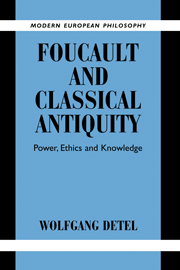2 - The ethical teleology
Summary
Foucault begins his analysis of classical ancient philosophy by looking at the ethical discourses that deal with sexual pleasure and its problematisation. This he does on the same four levels that he had previously identified as the central aspects of every ethical investigation – ethical substance, the mode of subjugation, the teleology and ethical work (i.e. the practice of the self that the subjects must be engaged in to transform themselves into moral persons). The textual basis he employs consists almost exclusively of passages from the works of Plato, Aristotle and Xenophon. The main results of his analyses of these texts can be summarised as follows.
The crucial passages studied by Foucault identify the aphrodosia – the dynamic of the interconnection of desires, sexual activity and pleasure which threatens to exceed all confines and destroy all order and reason – as the central subject of moral concern, that is as the ethical substance. Two main parameters are at the heart of the analysis of this dynamic: the quantitative degree of activity and the sexual polarity. It is not the forms of love and its practices that are important for the moral problematisation of pleasure, but the number and frequency of sexual acts, as well as the differentiation between the subject and the object of appetite – that is matters of moderation and greed, and of activity and passivity, in both heterosexual and homoerotic relationships. Appetite and pleasure are considered to be natural and necessary, and so are not intrinsically bad.
- Type
- Chapter
- Information
- Foucault and Classical AntiquityPower, Ethics and Knowledge, pp. 58 - 92Publisher: Cambridge University PressPrint publication year: 2005
- 2
- Cited by

